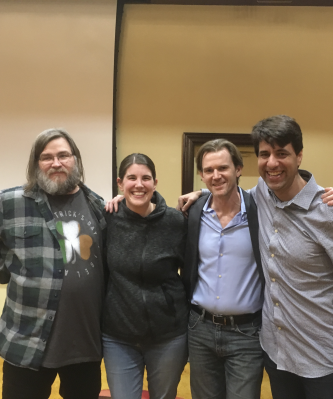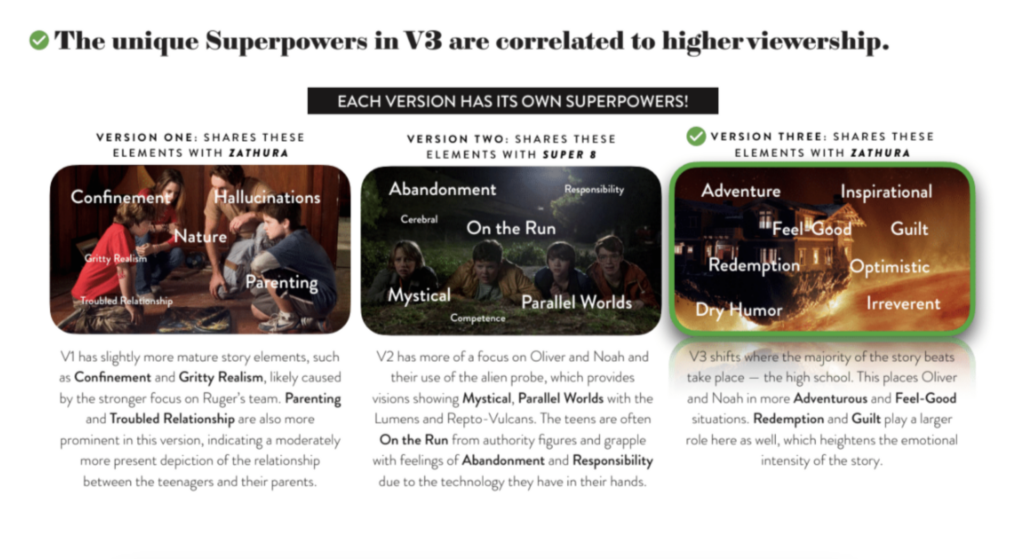Writer’s Room Meets AI Script Analysis: Taking a Leap of Faith
Posted: March 31, 2023 | Updated: April 20, 2023
Posted In: Articles, Case Studies
Have you ever found yourself so deep in the weeds on a story that you no longer know if it’s even any good? Or if the version you have this month is any better than the one you had last month (or the month before that)? Sterling & Stone found themselves in that exact situation, before the opportunity to work with AI Script Analysis completely changed the game.
AI Script Analysis completely changed the game…
Working in a collaborative, storytelling environment with the absolute freedom to create original works is a writer’s dream, and more than thirty novelists and screenwriters have found Sterling & Stone as a haven for creative storytelling.
Sterling & Stone was founded in 2012, fueled by three friends who felt compelled to share stories with the world. As a journalist and two copywriters, they were all in creative fields, but their new creative studio allowed them to focus their talents on telling stories. While their success didn’t come overnight, they quickly worked to produce hundreds of books, attracting a large, rabid fanbase eager to read their work. They then began adapting their stories for the screen, and added intellectual property acquisition and story incubation to their roster. Now they produce and option screenplays, choosing to take on both the roles of creating, and selling, their IP. Reginald the Vampire, the SYFY Channel adaptation of Sterling & Stone series Fat Vampire was recently renewed for season two and many of their scripts have been picked up for development across a breadth of production companies.
When we sat down to talk with Sterling & Stone about their script process, they told us about a particularly interesting challenge they were trying to solve. Their screen adaptation of the upcoming novel, Meltdown, had been through so many rounds of notes both in house and with their management team, that they were having a hard time deciding which iteration was the strongest to bring out. They loved the dialogue in one, and the relationship building in another, while a third had the strongest action set pieces.

They had one shot to impress the large list of producers who had asked to read the final script. How would they decide on a winner?
We recommended they try StoryFit’s Artificial Intelligence (AI) script analysis engine to gain some real data on each of the three versions in contention to decide which was strongest. Sean Platt, founder of Sterling & Stone, agreed to try the process in exchange for feedback on the end result.

Platt, Bonnie Johnston (Head of Story), and Niamh Arthur (Head of Development) provided three versions of the movie project “Meltdown” for the test. The team was wary of AI, but they knew that if they could see conclusive evidence on the strength of their scripts it would be invaluable to their ability to not just choose a version, but it would give them the tools to justify their artistic decisions to both their management team and any future studio notes.
The team were shocked, but delighted when StoryFit’s scene by scene analysis revealed the narrative elements, characters, and dialogue were all strongest in “Meltdown” Version 3.

“It really gave me a sense of excitement and relief,” said Arthur. “You had some really great visualizations… we’d instinctually gotten to the point that version 3 was strongest, but [the AI] is like this friend, a buddy that has our back.”
Platt chose the word, “Validation.”
“It was great to see that our intentions were mapped and that gives us a lot of confidence because guessing is expensive,” said Platt. “We have the ability [now] to validate our ideas globally.”
Beyond choosing the right version, Sterling & Stone also immediately recognized some simple tweaks they could make to Version 3 that would up the impact of the script and help deliver a better audience experience. Platt mentioned that Johnston, who is responsible for character development, was particularly impacted by the analysis. “Bonnie knows exactly what to do in the next revision, but more importantly, she knows why,” said Platt.
Overcoming fear and understanding AI script analytics

We were curious now that the Sterling & Stone team had seen firsthand how AI machine learning and natural language processing could produce earlier insights from scripts if they had advice for other creators?
While Platt and his team joked about keeping Storyfit’s AI script analysis as their own private “secret weapon”, they agreed they are complete converts. They wholeheartedly welcome AI to the world of storytelling. He confided, “It’s a wonderful addition to where creativity can go. And it’s totally inspiring. I feel like I’m lucky to be living through a Renaissance.”
“Things are already changing fast and they need to be aware of how it’s changing and to be on the side of the good guys who are working with creators and AI.”
“This is AI that’s not trying to replace you. It’s trying to harmonize with what you’re doing to create something better.”
